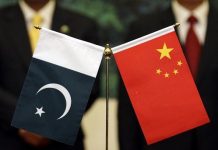Legendary Asian-American entrepreneur Jensen Huang, the founder, President and CEO of U.S. tech multinational NVIDIA, now seems in need of reassessing his business strategy. His dilemma: How to strike a balance between aligning with the U.S. technology blockade against China and preserving profits in the Chinese market.
NVIDIA is currently the industry leader in the field of advanced computing chips and is the world’s leading supplier of chips for artificial intelligence (AI). Currently, the company is in a golden age of rapid growth. According to its latest financial report, as of October 27, the company had achieved revenue of $35.08 billion in the third fiscal quarter, a 17-percent increase compared to the previous quarter and a new record in its history.
However, NVIDIA is grappling with challenges beyond business. Since February, the company has been subjected to antitrust investigations in Western countries, including the UK, France and the U.S. On December 5, The New York Times revealed that Huang had exploited loopholes in U.S. federal estate and gift tax laws to save his family approximately $8 billion in taxes, calling it potentially one of the largest tax avoidance cases in U.S. history. On December 9, China’s State Administration for Market Regulation also launched an antitrust investigation into NVIDIA. Amid these negative developments, NVIDIA’s market value has continued to decline since the stock market opened on December 9.
Some in the West believe that China’s antitrust investigation into NVIDIA is part of countermeasures against the U.S. Government’s latest export restrictions on AI-related chips and other technologies, which were announced on December 2.
This speculation does not fully explain the situation, as doing so requires providing background on the chips NVIDIA currently supplies to China. Before the U.S. Government banned the export of advanced chips to China in October 2022, NVIDIA dominated China’s AI chip market with over 90 percent market share and China accounting for about 26 percent of the company’s total revenue. However, due to the ban, NVIDIA was unable to supply its most advanced chips at the time, the A100 and H100, to the Chinese market. As a workaround, NVIDIA developed the A800 and H800 chips for China. These chips had their computing power and performance limited to avoid U.S. regulations.
But in October 2023, the U.S. Department of Commerce expanded the definition of advanced AI chips, and both the A800 and H800 chips were added to the banned list. As an alternative, NVIDIA developed three new chips for the Chinese market, including the H20. According to market
research firm SemiAnalysis, NVIDIA exported over 1 million H20 chips to China in 2024. Because of the restrictions imposed by the U.S. Government, NVIDIA’s performance in China has inevitably been affected. While the company has seen considerable revenue growth in China this year, it still remains below the levels seen prior to the U.S. export controls.
The reason behind China’s action against NVIDIA is that the company breached the commitments it made when acquiring the Israeli network equipment company Mellanox in 2020. Under World Trade Organization regulations, mergers and acquisitions involving multinational companies must be approved by the regulatory authorities in the countries where the companies’ primary markets are located. When NVIDIA acquired Mellanox, approval was required not only from the U.S. and Israel, but also from regulatory bodies in the European Union, China, Japan, the Republic of Korea and other countries. At that time, NVIDIA promised that, when selling related products in China, it would not force bundled sales or impose unreasonable conditions, and would continue to supply the products based on the principles of fairness, reasonableness, and non-discrimination. Clearly, although the customized, downgraded chips for the Chinese market were a last resort, they still constituted a breach of that promise.
Additionally, similar to those of the U.S. and the EU, China’s antitrust investigation into NVIDIA is also driven by the company’s ban on using CUDA software on hardware from other brands. Launched by NVIDIA in 2007, CUDA is a computing platform and programming model widely used in fields such as high-performance computing and deep learning. One of the biggest concerns for Chinese manufacturers is that if Washington further restricts the export of NVIDIA’s high-end chips to China, they will face both hardware and software shortages simultaneously. Such compatibility restrictions are undoubtedly a form of commercial monopoly.
China’s antitrust investigation is unlikely to have any major impact on NVIDIA or force it out of the China market. Any fine would be negligible for a giant with annual revenues in the tens of billions. A relevant example is the penalty China imposed on Qualcomm in February 2015 for its alleged monopolistic behavior in overcharging for wireless communication standards and abusing its market dominance. Qualcomm was fined $975 million, the largest antitrust fine ever imposed by China. However, it did not affect Qualcomm’s business in China. Recently, Qualcomm’s CEO Cristiano Amon said that, in the company’s most recent fiscal year, China accounted for 46 percent of its nearly $40 billion in revenue, and its cooperation with China had even increased during that period.
Compared to China, the U.S. Government may pose the bigger risk to NVIDIA. It is the U.S. trade ban that has prevented NVIDIA from selling its flagship products in the Chinese market, and has also forced China to pursue its own path of independent research and development.
Another story worth referencing is that of Qorvo, a U.S. company that produces 5G radio frequency chips. Its two largest customers were Apple and the Chinese tech giant Huawei. During the Donald Trump administration, Qorvo was banned from supplying chips to Huawei. Fearing a U.S. technology blockade, Chinese telecommunications companies made large purchases of Qorvo’s chips after Trump left office in 2020 and 2021, which pushed the company’s stock price to a new high in 2021. However, Chinese companies quickly developed their own radio frequency chips with independent intellectual property, and Qorvo’s market share in China was rapidly taken over. The two factories Qorvo had established in China were also acquired by Chinese firms. On November 3, Qorvo released its earnings report, revealing a net loss of $17.44 million for the third quarter of fiscal year 2024, a 117.89-percent decrease in earnings compared to the previous year. The reasons for the loss are multifaceted, but losing the Chinese market is a key factor.
Whether to give up the hard-earned Chinese market for an unattainable goal is a dilemma imposed on U.S. companies by their government. However, as the Chinese often say, practices of decoupling and supply chain disruption cannot halt China’s progress, and “small yard, high fences” can only trap the United States itself. –The Daily Mail-Beijing Review news exchange item






